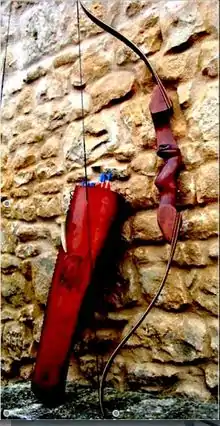quiver
English

Bow and quiver.
Pronunciation
Etymology 1
From Middle English quiver, from Anglo-Norman quivre, from Old Dutch cocare (compare Dutch koker), possibly ultimately from Proto-Mongolic *kökexür (“leather vessel for liquids”); see there for more. Replaced early modern English cocker.
Noun
quiver (plural quivers)
- (weaponry) A container for arrows, crossbow bolts or darts, such as those fired from a bow, crossbow or blowgun.
- 1598, William Shakespeare, Much Ado about Nothing, Act I, Scene I, line 271:
- Don Pedro: Nay, if Cupid have not spent all his quiver in Venice, thou wilt quake for this shortly.
- 1786, Francis Grose, A Treatise on Ancient Armour and Weapons, page 39:
- Arrows were carried in quiver, called also an arrow case, which served for the magazine, arrows for immediate use were worn in the girdle.
- 1598, William Shakespeare, Much Ado about Nothing, Act I, Scene I, line 271:
- (figuratively) A ready storage location for figurative tools or weapons.
- He's got lots of sales pitches in his quiver.
- (obsolete) The collective noun for cobras.
- (mathematics) A multidigraph.
Derived terms
Translations
arrow container
|
|
a ready storage location for figurative tools or weapons
collective noun for cobras
shaking or moving with a slight trembling motion
|
Etymology 2
From Middle English quiver, cwiver, from Old English *cwifer.
Adjective
Etymology 3
From Middle English quiveren, probably from the adjective.
Verb
quiver (third-person singular simple present quivers, present participle quivering, simple past and past participle quivered)
- (intransitive) To shake or move with slight and tremulous motion; to tremble; to quake; to shudder; to shiver.
- 1593, William Shakespeare, Titus Andronicus, Act II, Scene III, line 12:
- The birds chaunt melody on every bush, / The snake lies rolled in the cheerful sun, / The green leaves quiver with the cooling wind / And make a checker'd shadow on the ground.
- Addison
- And left the limbs still quivering on the ground.
- 1593, William Shakespeare, Titus Andronicus, Act II, Scene III, line 12:
Derived terms
Translations
shake or move with slight and tremulous motion
|
|
Middle English
Etymology 1
From Anglo-Norman quivre, from Old Dutch cocare; perhaps ultimately from Proto-Mongolic *kökexür. Doublet of coker.
Pronunciation
- IPA(key): /ˈkwivər/
Descendants
- English: quiver
References
- “quiver (n.)” in MED Online, Ann Arbor, Mich.: University of Michigan, 2007, retrieved 2018-05-04.
Etymology 2
From Old English *cwifer.
Pronunciation
- IPA(key): /ˈkwivər/
Descendants
- English: quiver
References
- “quiver (adj.)” in MED Online, Ann Arbor, Mich.: University of Michigan, 2007, retrieved 2018-05-04.
This article is issued from Wiktionary. The text is licensed under Creative Commons - Attribution - Sharealike. Additional terms may apply for the media files.